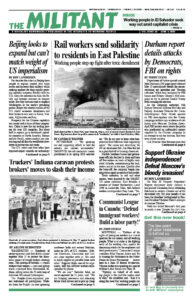As working people struggle to try and make ends meet, U.S. banks reported all-time record profits of $80 billion in the first quarter, up 33% from a year earlier. Over half of these profits went into the coffers of the First Citizens and Flagstar banks, which bought out the remnants of Silicon Valley Bank and Signature Bank, respectively, after they collapsed in March.
But the crisis facing regional banks didn’t end. At the beginning of May, First Republic Bank began bleeding depositors and the Federal Deposit Insurance Corporation seized it, then sold it May 1 at a bargain basement price to banking giant JPMorgan Chase. Chase is now three times the size it was before the 2008 financial crisis, with control over assets of nearly $4 trillion.
The capitalist rulers fear these bank failures could spread, threatening a broader economic crisis in the U.S. and worldwide. On the heels of the First Republic collapse, nearly 10% of depositors withdrew their funds from PacWest Bancorp. PacWest stock has plummeted over 70% so far this year.
A May 4 Gallup poll found 48% of people surveyed are worried about their deposits, a higher percentage than during the 2008 world financial crisis. The FDIC insures about $7.4 trillion deposited in U.S. banks. A larger amount — $10.5 trillion — is not insured, because it’s over the FDIC’s $250,000 cap on insurance. If the recent bank collapses were to expand into a broader banking crisis, this distinction would become meaningless. The funds the FDIC has to cover losses is $128 billion, enough to cover just 1.27% of all insured deposits!
‘Next shoe to drop’
Many regional banks have counted on making a killing in commercial real estate loans, a $5.6 trillion industry. But that isn’t going so well.
“US lenders warned that commercial property is ‘next shoe to drop,’” the May 9 Financial Times headline read. The paper interviewed billionaire Charlie Munger, vice chair of Warren Buffet’s Berkshire Hathaway. He said bluntly, banks are “full” of “bad loans” today.
“A lot of real estate isn’t so good any more,” he said. “We have a lot of troubled office buildings, a lot of troubled shopping centers.”
There’s 74.5 million square feet of vacant office space in New York City, enough to fill more than 26 Empire State Buildings. And Chicago, Los Angeles, San Francisco, Seattle and a number of other cities are facing a similar situation, as the effects of the pandemic, rising rents and mortgages, and deteriorating working and living conditions convinced many to move out of town.
The crisis wracking the banking system reflects a much deeper worldwide economic and social crisis, with declining capitalist production, trade and jobs, and rising prices on food, energy, housing, health care and other necessities workers need. Real wages have been stagnant since the 1970s. Birthrates have been cut in half since 1950.
Life expectancy in the U.S. has declined to 76 years, the lowest level in a quarter century. Suicides, drug overdoses, homicides and deadly car crashes have caused the death rate for children and teens to soar.
The government’s push to drive up interest rates in hopes of lowering inflation is wreaking even more havoc on workers and farmers. The Federal Reserve has increased rates from 0.5% in March 2022 to 5% today. Housing mortgage rates have more than doubled, payments on auto loans and credit cards are even higher. Jobless claims have risen. In the first week in May, applications for new unemployment benefits rose to 264,000, its highest level in 18 months.
In April, rent prices were 25% higher than they were in 2019. This makes it increasingly difficult for working people to afford a place to live on their own, to get married and raise a family. For workers earning $27,500 a year or less, nearly two-thirds of their income goes to the landlord.
The Consumer Price Index was 4.9% in April, but a number of necessities cost way more. This includes food, up 7.7%; housing, 8.1%; and electricity, 8.4%.
Among those being hit hardest by rising prices are millions who depend on Social Security benefits. What these monthly payments can buy has dropped by 36% since 2000. For bosses and their government, retired workers who aren’t generating profits are just a liability.

